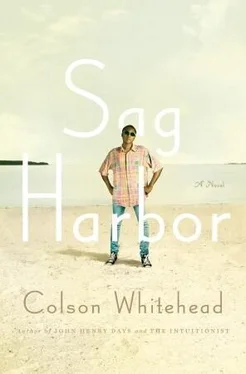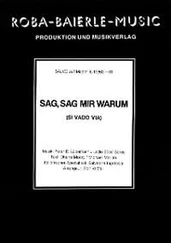For argument's sake, let's say there was a brand of character who was able to say, Forget that, I'm going to walk up and down Main Street with a watermelon under each arm! And one between my legs! Big grin on my face! Peak o' rush hour! Such rebellion was inherently self-conscious, overly determined. It doth protest too much, described an inner conflict as big as that of the watermelon-avoiders. We were all of us stuck whether we wanted to admit it or not. We were people, not performance artists, all appearances to the contrary.
But Nick! Nick embraced early '80s fashion of young black boys with verve and unashamed gusto. He loved two-tone jeans, gray in the front, black in the back, months out of fashion but authentic city artifacts in Sag. The fat laces on his Adidas were puffy and magnificent, and if he wasn't wearing his Jonni Waffle shirt with the sleeves rolled up juvenile delinquent — style, he wore a Knicks jersey that showed off his muscles. Said muscles which had been produced by lugging his radio around.
His radio was the most ridiculous thing, the biggest radio any of us had ever seen or ever would see. For the most part, the consumerelectronics industry focused its innovation toward miniaturization, the lighter Walkman, the more compact stereo. They reserved their passion for the gigantic for their televisions — except in the case of Nick's radio. In this one area, did they spare themselves their love for the discreet, the handsomely detailed diminutive. His radio was a yard wide, half as much tall, a gleaming silver slab of stereophonic dynamism. It didn't do much. Played the terrible East End radio stations. Played cassettes. Made a dub at the touch of a button. For all I know it was mostly air inside, save for the bushel of double-D batteries it took to power the thing, and which Nick spent most of his wages on. That, and the gold. Its only true talent was in the realm of volume, of producing the sound promised by its formidable frame. Nick never turned the dial past 7, after an incident he refused to describe. The two speakers were like big black eyes glaring out from the face of defiance itself. The radio said, I am, and what of it?
When we walked down the street with it — I could barely carry the thing, I'll admit — white people stared and elbowed each other in the gut and made little jokes to each other, which we could not hear because the radio was so perversely loud. Our parents shook their heads when they saw it, and said, “So, that's some radio Nick has,” when they saw his mother. We all worshipped it, and Nick was one of Martine's favorites so the radio had its own perch by the window.
“I'M BEAT,” Nick said.
“You're telling me,” I said. We'd both been on last night's shift. Wednesdays were the slowest days — it wasn't the rush that killed you, but the boredom. Boredom made you eat. Some more ice cream, another milk shake. Then when we had to mop, swab the decks out front, we could barely prod the bucket across the floor.
Martine held the freezer open for the delivery guy, directing the Oreo to the top for easy access. We went through Oreo pretty quickly and Martine had a keen sense of his customers' habits, the ebb and flow of their cravings. He was a new kind of entrepreneur in our sleepy hamlet, indeed the East End in general. A harbinger.
For years we'd hit the Tuck Shop for all our ice-cream needs. It was just around the corner next to the bank, and home to the town's video games. We spent a lot of time there, buying sodas, candy, and the occasional cone from Gabe, the owner and sole employee of the joint. We slapped our quarters down for next-up on Asteroids, Robotron, Galaga, Berzerk, the whole beeping-and-blipping rogues' gallery, establishing dibs by laying our coins next to the brown wounds in the plastic where the big kids had set down their cigarettes.
Gabe was a strange guy, an aging beatnik shipwrecked in Sag Harbor after what must have been a long unlikely story. Had he won the Tuck Shop in a weeklong poker marathon, or had it been left to him by an estranged uncle who wanted to make a man out of him? We saw him every day and didn't know anything about him. Tall and gaunt, his long dark hair rubber-banded into a ponytail, he wore a gray tweed jacket even on the hottest days and liked to pace out in front of the store smoking Pall Malls. He'd look out toward the water, smoothing out his Vandyke in thought, leaving us alone inside, trusting that the black boys wouldn't steal anything. And we didn't, though we obsessed over the fact that he left us alone. “That's a crazy white man right there.”
We'd graduated to different diversions and more pressing business and didn't loiter at the Tuck Shop anymore. The rest of the town, too — how could the humble Tuck Shop, with its paltry sugar and wafer cones, compete with the waffle, which was the future itself? Get outta here with that horse-and-buggy shit. Nope, Martine had the gimmick that got the people in the door and kept them coming back. The Sag Harbor Jonni Waffle was his third shop — he had two others up-island somewhere, successful enough for him to expand. It wasn't much of a gamble.
Martine was a stocky Dominican dude with pale eyes and stiff, short-cropped orange hair. He'd come to America as a teenager and described himself as “a real immigrant success story,” having worked his way up from bag boy at a grocery store in Queens to manager, to owner of that store and others. Recently he'd sold his empire and moved to Long Island, where he got into the ice-cream trade. I can see Martine sitting in the lounger of his new living-room set, plotting what to do with his grocery-store profits, flipping through a fat binder of franchise brochures. He comes to the Jonni Waffle pamphlet—“True Belgian Flavor!”—and the pictures and text address something deep in his nomad soul. “This is a nation of immigrants,” he'd say in wonder, when he came in on Monday and surveyed the damage of the weekend rushes. Which didn't make much sense — was he saying that our customers were literally immigrants, or was he addressing a larger notion of universal dispossession briefly remedied by ice cream? “Immigrants!”
“Some of us came on slave ships,” NP would say.
“Always so negative!” Martine responded. NP was on the ten-cent-raise track. So you know.
Martine had plenty of philosophical nuggets he'd scoop out and share from time to time, mostly related to the intersection of certain theories he had about human behavior and ice-cream-store management. “No one wants to look at fruit flies,” he'd murmur to the Toppings Bar, while shooing away the tiny swarm hovering over the raspberries, the tenor of his voice making it clear he wasn't really referring to fruit flies but something else. Some elusive profundity. “Heavy cone, light of heart” was another favorite, expressing his joy at the sight of a customer's arm dipping under the weight of a triple-scooped extravaganza. “People come here for a crunchy flight of fancy” was an end-of-shift declaration of satisfaction at his life's course.
Obviously, he was black.
“Don't pull that shit on me,” NP told Nick, the architect of this provocation. “He has blue eyes and blond hair.”
“I'd say they were hazel, shit, your sister Mary has those hazel eyes,” Nick countered, anticipating this attack. “And his hair is that red you see on those Caribbean niggers sometimes, and that's where he's from, Dominica.”
NP shook his head.
“What about Little John?” I said. Little John was Bobby's cousin. He had straight dirty-blond hair, gray eyes, and an indisputably Caucasian cast to his features, profile-on-a-coin Caucasian cast. But he was Bobby's cousin, and he acted black enough … frankly we never really talked about it. In fact, maybe we made an extra effort not to talk about it.
Читать дальше












